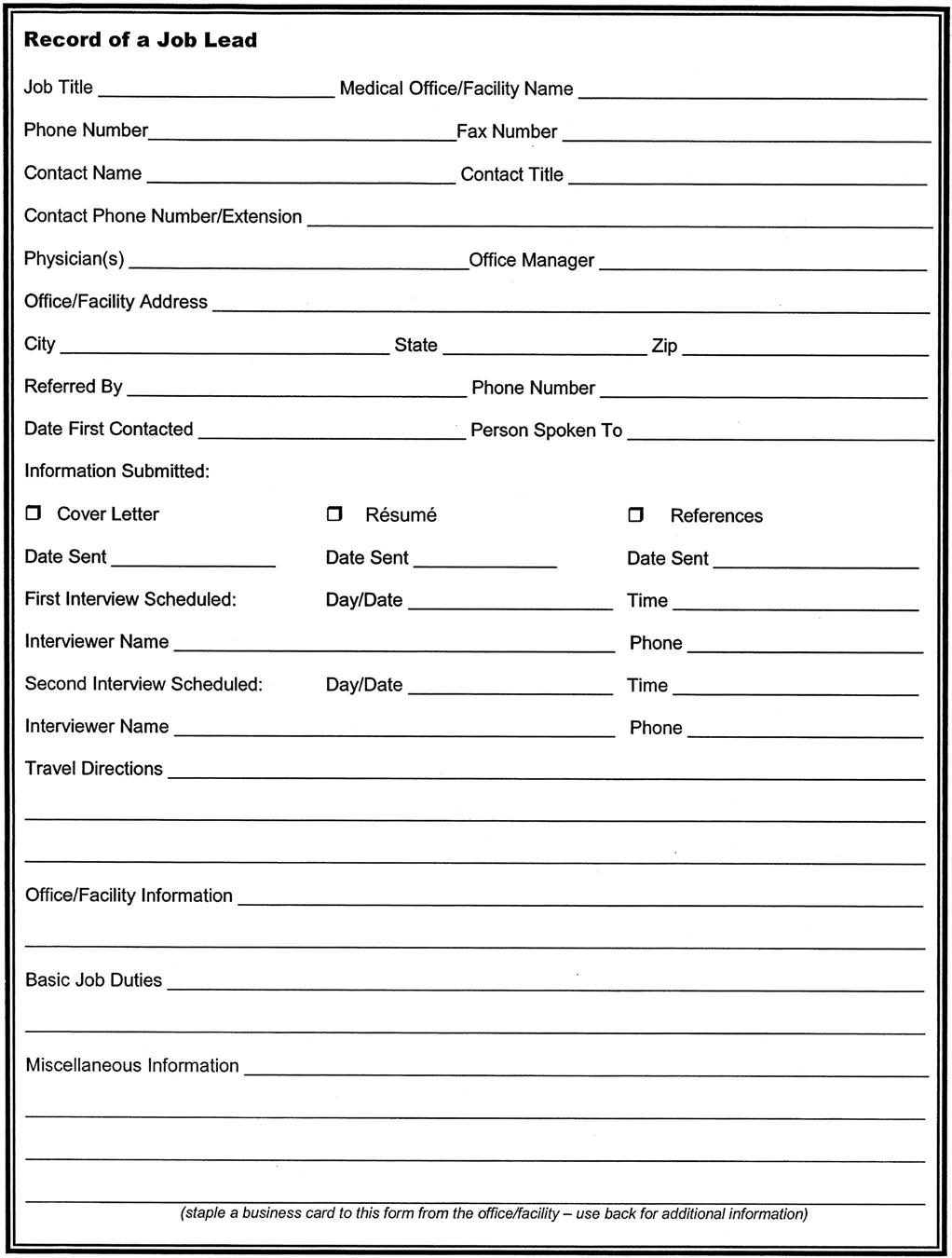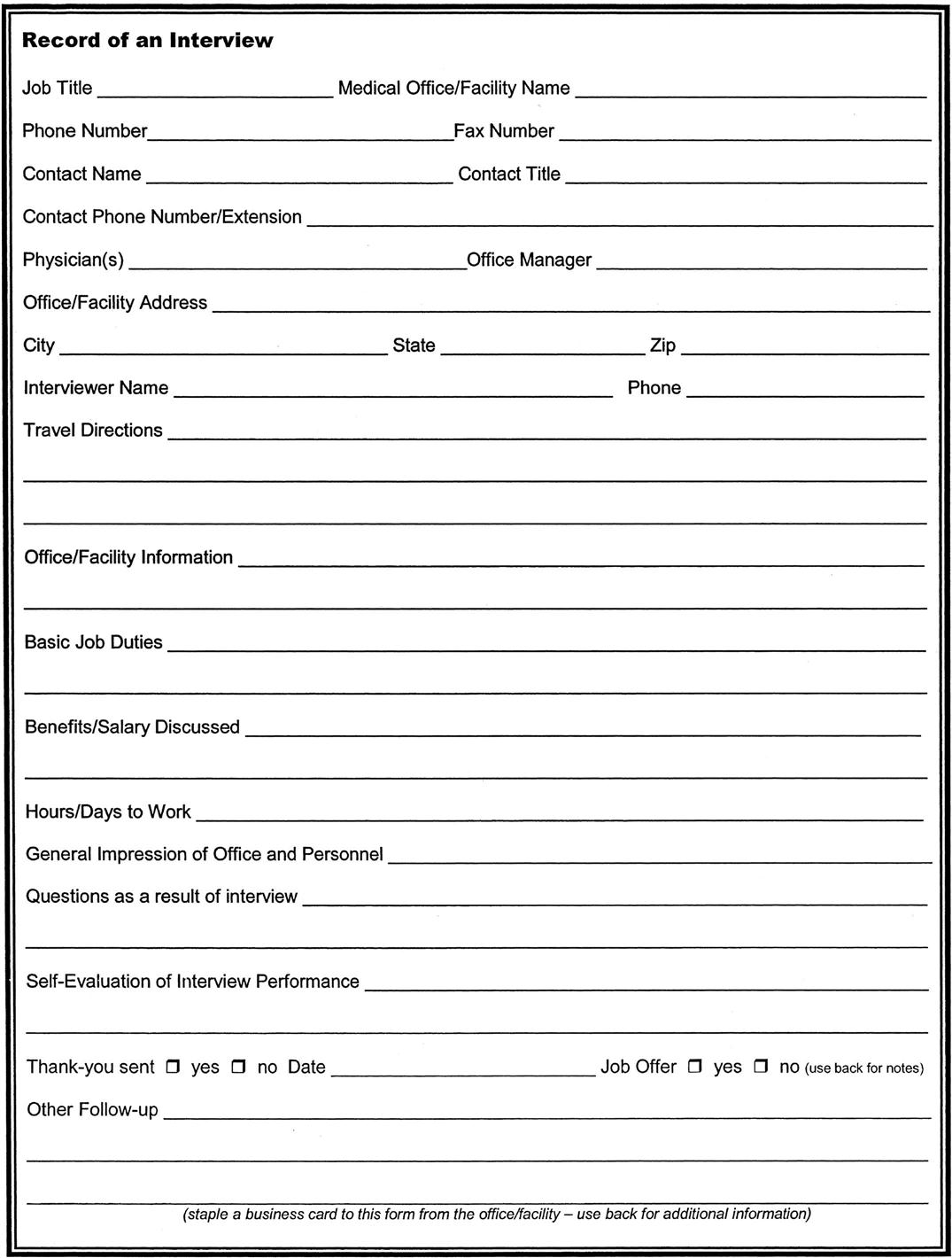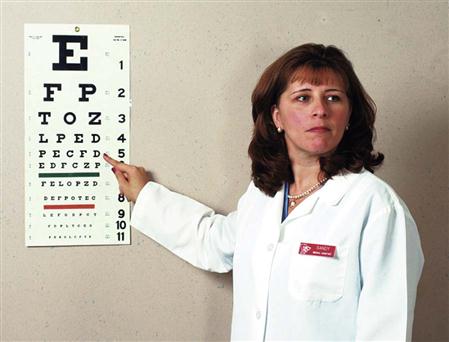Career Development and Life Skills
Learning Objectives
1. Define, spell, and pronounce the terms listed in the vocabulary.
2. Discuss the reasons job search training is important to a medical assistant.
3. List three expectations employers have of employees.
4. Understand the three types of employee skill strengths.
5. Explain the two best job search methods.
6. Describe some of the errors that should be avoided on a resumé.
7. List the four phases of the interview process.
9. List and discuss legal and illegal interview questions.
10. Discuss the importance of the probationary period for a new employee.
11. List some common early mistakes of which a new employee should be aware.
12. Understand the importance of maintaining liability coverage once employed in the industry.
13. Explain why a performance appraisal rating is usually not perfect.
16. Complete a job application.
Vocabulary
counteroffer Return offer made by one who has rejected an offer or a job.
default To fail to pay a financial debt, such as a student loan.
deferment Postponement, especially of a student loan.
genuineness Expressing sincerity and honest feeling.
intolerable Not tolerable or bearable.
mock Simulated; intended for imitation or practice.
pertinent (pur′-tuh-nent) Having a clear, decisive relevance to the matter at hand.
proofread To read and mark corrections.
rectify (rek′-tuh-fy) To correct by removing errors.
subtle Ingenious; artful; delicate.
succinct (suhk-sinkt′) Marked by compact, precise expression without wasted words.
synopsis Condensed statement or outline.
vocation The work in which a person is regularly employed.
Scenario
Lisa Walker is 1 month away from graduating from her medical assisting program. She has been an excellent student and is looking forward to beginning her career in the medical field. Lisa wants to begin her job search now so that she will be employed soon after her externship ends.
Lisa participated in several volunteer activities while she attended school. She plans to list these experiences on her resumé. She met many office managers and physicians while doing volunteer work, and she will be contacting those people in hopes of obtaining more job leads.
Lisa began saving for interview clothing when she first began school. She is on a strict budget, but she found several outfits appropriate for interviews at secondhand clothing shops and discount stores. Her best-looking suit cost only $25!
Not a person afraid to interview, Lisa looks forward to sharing her skills and experience with potential employers. She looks on each interview as a practice session for the next one, and this helps her relax more and present a true picture of herself to the office manager. She has a great smile and projects a natural friendliness and positive attitude.
Lisa has given much thought to what she wants from her first job as a medical assistant. She knows that she may not start at a high salary, but she also realizes that there are benefits and perquisites (“perks”) to working in a physician’s office. She plans to commit to working for 2 years on her first job, gaining experience before looking for her next job at a higher salary and with additional benefits.
Lisa is excited about her future as a medical assistant. She is ready to put the training she received to work with patients. She is determined to perform exceptionally well at her externship site and to go above and beyond her assigned duties to impress the staff in that facility, who will become references for her first paid position. Lisa is dedicated to being the best medical assistant possible and to becoming indispensable to her employer.
While studying this chapter, think about the following questions:
• How can the medical assistant prepare for his or her first job throughout the duration of training?
• What is meant by “writing your resumé every day”?
• How can the medical assistant organize the job search?
Each day a person exists is a small portion of a whole—a part of a person’s entire lifetime. The events that happen during a day, no matter how small, shape the future. In the same way, the events that happen in the life of a medical assistant play a role in shaping his or her career. Every day, the medical assistant “writes a resumé”—through actions that reveal strengths, highlight skills, and summarize accomplishments—that builds on his or her vocation. Each duty performed becomes a part of the medical assistant’s sum of experience and is important in the overall growth of the individual. Each action taken can have an impact on the future for the medical assistant. If the actions are professional, accurate, and performed to the individual’s utmost ability, the resumé the medical assistant is writing will be one that leads to greater opportunities. If the medical assistant performs poorly, the resumé will be one that does not reflect trustworthiness and dependability. The small decisions made each day greatly affect the overall impression the medical assistant makes in the workplace.
Most people seeking employment have never had any type of formal training in the job search process. A newly graduated medical assistant should take advantage of job search training for three reasons:
What Does the Employer Want?
Employers have three basic desires when they interview individuals for a job:
• They want a person who has a neat appearance and looks as if he or she fits the job (Figure 58-1).
From the beginning of the job search process, a medical assistant’s attitude is the most critical part of his or her potential success in getting a job (Figure 58-2). A good attitude is not a trait that can be developed overnight. For this reason, a medical assistant must have a positive outlook in all situations so that the genuineness of his or her demeanor is clear during job interviews. The attitude displayed during training and externships is likely to be the same attitude that will be evident on the job. Make it a positive, enthusiastic one.
Assessing Strengths
Before promoting himself or herself as a potential employee, a medical assistant must first determine the strengths that make him or her a valuable team member. The three types of skill strengths are job skills, self-management skills, and transferable skills.
Job skills are the abilities the medical assistant needs to perform the job. These include such skills as performing venipuncture, billing insurance, answering the telephone, scheduling appointments, giving injections, and handling other tasks.
Self-management skills relate to the medical assistant’s personality and character traits. They include such attributes as honesty, integrity, and enthusiasm.
Transferable skills can be taken from one job to another. For instance, if the medical assistant has the ability to communicate effectively, this skill can be used on every job. Leadership is a transferable skill, as are the ability to follow directions and the ability to manage people.
Developing Career Objectives
Each medical assistant has a reason for entering the healthcare field. This basic desire should influence decisions concerning his or her career choices. Because medical assisting is such a versatile profession, a medical assistant has numerous options after graduation.
Medical assistants should take some time to think about what they want from their career. While attending school and subsequently completing an externship, ideas may surface about the area of healthcare in which the medical assistant most wants to work.
When developing career objectives, the medical assistant should start by asking several questions:
• Where do I want to be in 5 years?
• Where do I want to be in 10 years?
• What additional skills do I need to get where I want to go?
Write down the questions and answers and go into specific detail. Set realistic goals and develop a plan as to how and when they will be reached. It is helpful to put a list of goals in a prominent place at home, where you can see them each day. Some people use a spiral notebook, the front of the refrigerator, or Post-it notes attached to a mirror in the area where they get dressed. Keep goals in a visible place to keep them in mind even on the more difficult days, when they seem far from sight.
Knowing Personal Needs
When searching for a job, the medical assistant must evaluate all of his or her needs. Most people have a minimum salary they require, in addition to certain benefits. For example, if the medical assistant is a single mother, she may require a moderate salary and insist on health insurance benefits. We also have intrinsic needs, which are internal desires important to us personally.
A helpful activity is to write a synopsis of a typical day on an ideal medical assisting job. Imagine the type of office, the job title, the daily duties, and the salary and benefits that would be a part of the ideal job (Figure 58-3). This can help you develop a focus and a goal to work toward as your career develops.
Finding a Job
Many people have misconceptions about the job market that exists today. Fortunately, the medical field is not an industry that sees high levels of unemployment. Usually, healthcare percentages remain high even in a poor economy. Graduation from a medical assisting program does not guarantee that the student will obtain employment. Completion of the program gives the medical assistant the job skills needed to work, but a good attitude and positive outlook are essential for success in the job search. In addition, the medical assistant should always be open to new and better opportunities.
Some job seekers assume that potential employers will not interact with students until they graduate. However, prospecting before graduation is a smart idea, and there are subtle ways of introducing oneself to a facility without bluntly asking for employment. Many also think they must have work experience to be hired, but employers are more interested in attitude and “teachability” than a long resumé full of experience. In fact, many physicians like hiring students fresh from school so that they can teach them specifically how they want procedures done before the new graduate gets used to doing them another way.
Two Best Job Search Methods
Although there are many ways to find employment, two methods have proved to be the best and most effective: networking and direct contact with employers.
Networking is the exchange of information or services among individuals, groups, or institutions. When related to a job search, networking involves meeting and getting to know individuals in the same or similar career fields and sharing information about available opportunities. A medical assistant should begin to form a network of friends, business associates, co-workers, and acquaintances early in training, and he or she should stay in contact with these people throughout the job search effort and beyond (Figure 58-4). E-mail, Facebook, MySpace, and other electronic advances make staying in touch with former classmates and instructors very easy.

How does one network? One way is by joining professional medical assisting organizations. The members who attend regular meetings often know about job leads in the area. The medical assistant should also tell his or her personal physician or physicians about being in school and the approximate time of graduation. Friends and family members can be on the lookout for potential opportunities and may help by asking their personal physicians if they are aware of positions that will open for applications soon. Always keep a few resumés on hand; the opportunity to network could come at any time.
Networking is not limited to job searching, and many organizations are formed to develop networks of individuals or groups that assist one another and refer clients to one another. However, these groups are useful to the person who is looking for employment, and by attending meetings and get-togethers held for networking purposes, medical assistants may happen onto the ideal job for which they have been looking.
Direct contact with employers is also an effective method of job searching. Medical assistants often know of specific clinics or facilities they would like to investigate as job possibilities. Compile a list of these places and learn as much about them as possible. If the facility has a Web site, read it thoroughly. Ask for brochures or patient information packets offered by the employer. Some have an annual report that lists details about the organization. All this information helps the medical assistant get a good basic idea of why the facility exists and what it does for the community.
Contact with employers does not necessarily begin only after the student has graduated. Students can begin networking and contacting employers from the very start of their enrollment at school. The student can keep a file of potential employers. Take a drive around the area where your home is located and make note of the medical facilities close by. Then, determine the facilities that are good prospects for employment and begin researching them. Call to find out who supervises medical assistants in the facility. In a physician’s office, this usually is the office manager. Then call the office manager and ask to make an appointment to learn about the facility. Even the busiest people usually are willing to help a student investigate healthcare facilities in the area.
Do not tell the office manager that the objective of the appointment is a job offer. The goal at this point is to learn about the facility, what it offers the community, and what roles the medical assistants in the facility perform. Suggest that the appointment be set at the office manager’s convenience. Then treat the appointment like an actual job interview, dressing appropriately and arriving on time. Do not be late or cancel without calling first. Have a list of questions about the facility prepared in advance and do not take too much of the office manager’s time. Take notes about what the office manager says about the facility so that you can refer to them after graduation, during the actual job search.
After the appointment with the office manager, ask for a business card and always send a thank you note or letter. Remember this critical point! This helps the office manager remember the name of the medical assistant, and it is a pleasant addition to the daily mail. Everyone enjoys being recognized for his or her efforts, and the office manager will appreciate the thank you note.
Toward time for graduation, determine the possibility of performing an externship at one of the facilities you visited early in training. Check with school regulations to determine whether this is possible. Then the office manager can be approached about allowing the student to extern in the office. Be sure to follow school guidelines when investigating these possibilities. Some schools allow students to secure their own externship sites, but this must be discussed with the externship supervisor at school. Performing an externship at a medical facility usually is the first practical experience the student has in the medical field and can be used as a reference in building a resumé.
After the externship is complete, the medical assistant may want to send a resumé to all the office managers he or she met through the direct contact efforts made earlier in training. A professional resumé with a cover letter that refers to the earlier meeting will prompt the office manager to remember the student. Ask in the cover letter whether any opportunities are available in the facility. Mention that the facility and staff were impressive on the first meeting and that the facility would be an exciting place to begin a career. In the letter request that, if the office manager does not have any positions available at that time, he or she keep the resumé on file or pass it along to an acquaintance who is looking for an additional staff member.
Internet and the Job Search
The Internet opens a whole new world of opportunity when it comes to job searches. The medical assistant can find a gargantuan amount of information about writing resumés, interviewing, and follow-up methods, but perhaps most important, the Internet can provide information about who is hiring right now.
Many databases provide information about job openings. Monster, Yahoo! Jobs, and the Online Career Center are a few examples. The search can be targeted to specific geographic areas, certain career fields, or even specific job titles. Conduct a search in a selected state (or metropolitan area), then look for jobs in the medical profession, then narrow the field even more by asking for information on jobs specifically for medical assistants.
The medical assistant also can express interest in a job by perusing the company Web site and then contacting the employer directly on the “contact us” page. Anyone looking at the Web site should be able to find an e-mail address to use for gathering additional information. Mention that the school encourages quality businesses as potential employers and ask for information that could be presented to a class. Most employers are happy to get the word out about their company and may give all kinds of pamphlets and “freebies” to share with a class. By sending a thank you note and staying in touch with the company, the medical assistant creates a new lead for the job search.
Just remember, the information available to one medical assistant on the Internet is also available to every other medical assistant. The Internet is great for researching positions and companies, but networking and direct contact are still the most successful ways to obtain a job. All the elements of the medical assistant’s “whole package”—the resumé, application, interview, follow-up, attitude, appearance, and job skills—combine to make an impression on the employer. Will that impression be favorable enough to result in a job offer?
Traditional Job Search Methods
The more traditional job search methods may be effective but usually are not as successful as networking and contacting employers directly.
School Career Placement Offices
Students usually have lifetime access to their school placement offices. Take advantage of the job search classes held at the school and seek advice regularly from the placement officers. They can suggest facilities that have job openings and will often make appointments for interviews. The placement office should be the first resource for the student’s job search.
Newspaper Ads
Newspaper ads normally produce a huge number of applicants and resumés for the employer. A resumé or application must stand out in the crowd to be noticed when it arrives at the facility. Some applicants use clear envelopes, which draw attention to the resumé quickly in a stack of mail.
Employment Agencies
Employment agencies usually charge a fee for their services. Even when the employer pays the fee, the medical assistant may be offered a lower wage to compensate for the fee. These agencies can be useful, however, especially in salary negotiations. The agency knows the salary range the employer is willing to pay. This means that medical assistants can command a salary within that range and are not short-changed by asking for a salary that is much lower than the employer is willing to pay.
Professional Organizations
Joining local chapters of medical assistant organizations, such as the American Association of Medical Assistants (AAMA) or the American Medical Technologists (AMT), can help the student in many ways. Not only is valuable information exchanged at the meetings, but the medical assistant also may hear of positions becoming available in various medical facilities. Participating in professional organizations is a form of networking with the added benefit of continuing educational opportunities.
Volunteering
By volunteering in medical offices or facilities, the medical assistant meets other professionals who may be able to provide job leads. Volunteer activities should be added to the resumé, because these valuable experiences often can be used in the physician’s office as well. It does not matter that the position was not a paid job; experience counts, whether paid or not.
Mailing Resumés
Mailing a large number of resumés is not a very effective method of searching for a job. Out of 100 resumés sent, one or two potential employers may respond with a request for an interview. It is much more effective to network first, then follow up with a good cover letter and resumé. Resumés can be used when contacting employers directly, and this approach allows the medical assistant to meet at least one employee of the facility when the document is delivered. Be sure to ask for a business card and write down the name of the person to whom the resumé was delivered. For impressive facilities, send a note of thanks to the person who accepted the resumé, asking to be considered for future positions.
Cold Calling
Cold calling is contacting employers by phone and prospecting for available positions. If the medical assistant asks, “Are you hiring?” at the beginning of the conversation, he or she should expect a negative answer and has just wasted the call. This is all but useless in the job search effort. However, an assistant who calls for information about the clinic and schedules an appointment with the office manager may have more success. Most office managers are open to talking with a medical assistant about the profession and will gladly make an appointment if it can be at their convenience. Some would not even consider interrupting their day just to talk with a student medical assistant, but most are happy to help new graduates obtain answers to questions and get started in their medical career. However, do not waste the time the person has offered. Prepare a list of questions in advance and be sure to ask about the interviewer’s career in the healthcare industry. People enjoy talking about themselves and their accomplishments, and valuable information may be gleaned from hearing how the office manager started in healthcare. Never attempt to get a job over the phone. Even when interested employers call and ask questions, attempt to set up an interview to discuss your qualifications in person.
Performing Well on Externships
Performing well on externships may be one of the best ways to secure a job. If an opening exists, the medical assistant extern is already oriented to the practice and may be the perfect fit for the job. Perform duties assigned on the externship as if they were final examinations at school. Even if the office does not have a position available at that time, there may be one soon, or the office manager or physician may know of an office that has an opening. Do the best job possible, and an employment offer may be waiting at the conclusion of the externship. Be ready to learn from the moment the externship begins until the moment it ends.
Organizing the Job Search
Seeking a job is a full-time job. The new medical assistant must put forth effort, have stamina, and be persistent. Do not expect to get a job with the first practice that offers an interview. By keeping track of opportunities found, the medical assistant is more likely to obtain employment soon after graduation (Procedure 58-1).
A job lead is any information that could lead to a position, either now or in the future. Some of the most promising job leads for the newly graduated medical assistant come from the externship experience. Be friendly and meet as many people as possible while completing this part of training. Ask for business cards and stay in contact with the medical professionals you meet at the externship site and nearby hospitals. Be willing to shake hands and make introductions at all times so that the circle of promising contacts for job leads continues to expand.
The medical assistant would be wise to keep a record of all job leads (Figure 58-5). The name and address of the facility, a contact name, and phone numbers all are important pieces of information. Keep track of where the lead was obtained; if it was provided by an individual, thank that person properly, especially if the lead results in a job offer. These records are an excellent starting place when making calls to set up job interviews. Remember, the placement office at school is a resource for job leads but should not be the only source used for obtaining leads. Each medical assistant graduate must take personal responsibility for finding and following up on job opportunities.

The job lead is not the only information that should be recorded during job search efforts. Keep a record of arrangements when an interview is secured, including information such as the following:
• Day, date, and time of the interview
• Directions to the interview site
• Items to bring to the interview
As soon as the interview is over, make a few notes about what happened during the interview. After several interviews, remembering which facility offered what salary, which had medical benefits, and which was closest to home may be difficult. By keeping accurate records, the medical assistant can follow up in the appropriate manner and send a note or letter of appreciation to the person who conducted the interview (Figure 58-6).

Developing a Resumé
A resumé is a fact sheet that summarizes an applicant’s qualifications, education, and experience. Medical assistants must determine what to include in the resumé, remembering that they are “selling” themselves to an employer (Procedure 58-2). The resumé should be developed before cover letters are written or job applications are completed so that strengths can be identified and highlighted on all job search documents.











